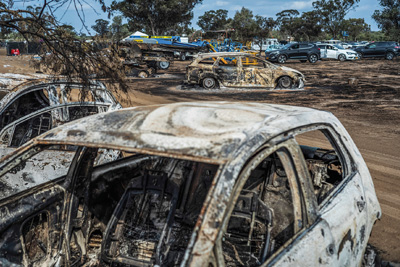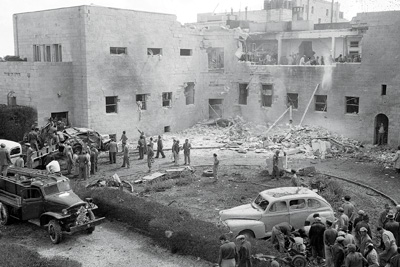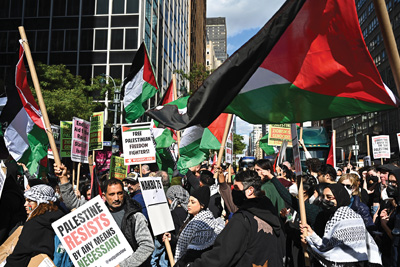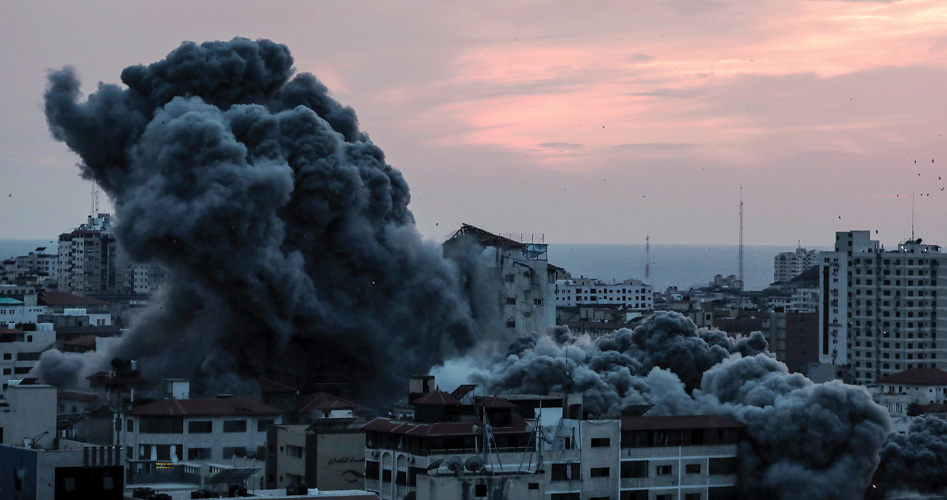Behind the Israel-Gaza War
At dawn on October 7, a sprawling music festival was underway outside the southwestern Israeli settlement of Re’im kibbutz, roughly three miles from the border of the Gaza Strip. Founded in 1949, Re’im had a population of a little more than 400 people. But thousands more had turned up for the Supernova music festival, an event intended to honor the Jewish holiday of Sukkot. At about 6:30 in the morning, the sky above the partygoers filled with rockets out of Gaza, and air-raid sirens began wailing. From long experience of such periodic bombardments, most of those at the festival knew that staying outdoors was usually the safest option during a rocket attack. Milling around uneasily, they waited for the latest attack to subside, taking videos of the rockets flashing overhead.
Some of the videos, however, captured something else: black dots in the sky across the countryside that, unbeknownst to the many doomed spectators, were airborne Hamas commandos riding paragliders deep into Israeli territory, the vanguard of a larger ground invasion that was to come.
About half an hour after the rocket barrage had begun, the partygoers began to hear approaching gunfire and explosions, and the word ran swiftly through the crowds: The terrorists are coming! The more fortunate ones acted immediately, jumping into cars and fleeing the scene at breakneck speeds. Others began running across the open fields, now fully aware that something far worse than rockets was closing in fast. Within minutes, scores of heavily armed Hamas militants converged on the festival grounds from the west and north and began firing indiscriminately with automatic weapons and RPGs at the crowds of people. Moving quickly, they surrounded large groups of partiers who had not been quick enough to escape and began methodically massacring them. Dashcam videos from parked cars recorded additional horrors: people cowering behind and inside vehicles shot to death at point blank range, while others were dragged, bloody and screaming, into the terrorists’ vehicles for transport back to Gaza.
Many of the partygoers fled into a large eucalyptus forest, only to be callously hunted and murdered as they sought refuge among the trees. A few who climbed high in the trees were overlooked and survived the carnage. In all, at least 260 people at the festival were slaughtered in the worst single episode of civilian mass murder in modern Israel’s bloody history, and countless others were taken into captivity, to be held as bargaining chips and human shields against the Israeli retaliation that was sure to follow.

Aftermath: Destroyed vehicles at the site of the Supernova concert where at least 260 concertgoers were butchered by Hamas terrorists on the morning of October 7. (AP Images)
But as awful as the events at Re’im were that morning, even worse barbarities were unfolding elsewhere, as more than a thousand Hamas militants systematically fanned out across the countryside, murdering every human being they could find, regardless of age, sex, ethnicity, or combatant status. Unprepared local policemen and security guards were gunned down, but so were hundreds of unarmed elderly, women, and children cowering inside safe rooms and even sleeping in their beds. Some of the worst atrocities were reserved for the most innocent, with documented instances of small children and infants being burned alive in front of their parents, or being forced to watch as their parents were killed in various sadistic fashions. Some children and infants were even beheaded. And elderly Holocaust survivors were butchered with indifference. Masses of people discovered hiding in basements and public shelters were slaughtered with grenades and machine-gun fire.
When Israeli Defense Forces finally retook the area from Hamas after more than a day of bitter fighting, they found a nightmare landscape had replaced the tranquil fields, villages, and kibbutzim of southwestern Israel. More than a thousand bodies, many of them hideously mutilated by every depraved artifice of the sadistic marauders, filled burned out buildings and cars, and were strewn across fields, roads, and streets. The stench of blood and death was everywhere. Destroyed cars littered the roadways and parking lots, and many homes and public buildings lay in partial or total ruin. And any doubts over the scope of what had happened were rapidly dispelled by myriad videos depicting the gleeful slaughter, posted online to a rapturous reception by Hamas supporters worldwide.
All in all, the events of October 7 mark the darkest day in Jewish history since the Holocaust. For the first time since the 1948 war that followed the creation of modern Israel, enemy military forces invaded Israeli soil and inflicted massive damages on the civilian population. The death toll is still rising as of this writing, but more than 1,300 Israelis, as well as a significant number of visiting foreigners, were killed on that day, while the military retaliation against Gaza soon more than doubled the number of fatalities in what is sure to be a protracted and bloody conflict. At least 30 American citizens are known to be among the dead, along with an indeterminate number taken hostage in Gaza. Twenty-one citizens of Thailand, who were in Israel as migrant workers, also perished in the indiscriminate carnage. And following Israel’s first official declaration of war in 50 years, the Israeli government has agreed to put aside the bitter partisan infighting of the last 10 months and form a unity wartime government.
Uncertain at the time of this writing is how far the war may spread. After issuing strong statements of solidarity with Israel, a suddenly energized President Biden dispatched a carrier strike group to the eastern Mediterranean, led by America’s newest, largest, and most modern aircraft carrier, the USS Gerald R. Ford. A second carrier strike group led by the USS Dwight D. Eisenhower is also en route at the time of this writing. Amid increasing fighting with Hezbollah forces along Israel’s northern border and Israeli air force raids on Syrian airfields, the possibility of a wider, multi-front war, possibly even extending to Iran and its supporters, cannot be ruled out. While the Biden administration is warning Iran not to get involved and cautioning Israel to abide by the rules of war, there is no question that the dogs of war have already slipped their leashes. In the permanent conflagration of the Middle East, it is impossible to tell how far the flames of destruction may spread.
To no one’s surprise, the Netanyahu-led Israeli government lost no time unleashing retaliatory strikes for the appalling deed. Targeted bombardment of Gaza, which has brought down a number of high-rise buildings, has been ongoing since Day 1, and large numbers of tanks and infantry are poised to enter Gaza to conduct ground operations. Skirmishes with Hezbollah along the northern border have already taken a toll, and are likely to open a second front. But as of this writing, both Israel and the United States have refrained from taking any direct action against Iran, the regime most directly responsible for financing, supplying, and training Hamas (and Hezbollah).
A Look Back
The bitter mutual hatred and distrust between Palestinians and Israelis was inflamed by the creation of the modern state of Israel in 1948, but rival claims to the Holy Land are complex and go back centuries. Since the expulsion of most of the Jews from Roman Judea in the first century A.D., the region has changed hands many times, falling under the Christian rule of the Eastern Roman Empire (or Byzantine Empire) for several centuries before being conquered by Muslims in 637. During the Byzantine period, there were Jewish communities recorded in various parts of Palestine. The land was then retaken by Christian forces in 1099 during the First Crusade, by which time there was a substantial Jewish presence in the area once again. When Godfrey of Bouillion’s victorious crusader army overran Jerusalem, putting most of the resident population to the sword, among them was a Jewish population and a thriving synagogue. When the Zionist movement arose in the 19th century and European Jews began migrating to Palestine, then under control of the Ottoman Turks, they joined the so-called Yishuv Jews already living there. Following the defeat of the Ottomans in World War I, the British took control of the region, styled Mandatory Palestine, and tried to govern in a manner that acknowledged the rights of both Jews and Palestinians. This arrangement satisfied no one, with both Arabs and Jews conducting insurgencies against the British authorities. The Balfour Declaration of 1917 had already made clear that British policy was to favor the creation of a Jewish state in the Middle East, an aim that became politically feasible after the extreme horrors unleashed against European Jews by the Holocaust — and the comparative inactivity of many Allied governments to give refuge to Jews fleeing Nazi pogroms.
Immediately following the declaration of an independent Jewish state on May 14, 1948, five surrounding Arab nations launched a war against Israel in an attempt to preemptively obliterate what they regarded as an illegitimate regime run by interlopers. Israel prevailed against its enemies, and since then has fought many wars large and small against both neighboring states (including the 1967 Six-Day War, the 1973 Yom Kippur War, and the 1982 Lebanon War) and terrorist factions such as Hamas and Hezbollah.
Birthed in war: The partly destroyed Jewish agency building in Palestine, heavily damaged by a bomb in March 1948, soon before the modern state of Israel declared its independence on May 14. The following day, a coalition of Arab countries, including Egypt, Iraq, and Transjordan, invaded the new country and launched a 10-month war. (AP Images)

While many outside of the Middle East have tended to favor a “two-state solution” to the problem — i.e., the establishment of separate states for the Jews and for the Palestinians — attitudes among these two groups have hardened to the point where majorities on both sides now favor a “one-state solution” that would completely exclude the other side.
Regardless of any abstract justice that may attach to the Palestinian cause, they have done themselves no service over the years by frequently resorting to terrorist tactics, of which the barbarities perpetrated on October 7 by Hamas were but the latest and most brutal, but far from the only, example. Beginning in the 1970s, the Palestinian terrorist organization Black September unleashed a decade and a half of international havoc, deliberately targeting Americans as well as Israelis. On November 11, 1971, for example, Black September bombed the Intercontinental Hotel in Amman, Jordan, in an attempt to murder Americans staying there. Less than three weeks later, they assassinated the prime minister of Jordan in Cairo. The following May, they hijacked a Sabena Airlines flight and diverted it to Tel Aviv. Israeli commandoes stormed the plane, and one passenger and two terrorists were killed in the ensuing gun battle. In September 1972, one of the most notorious terrorist attacks of the 20th century took place at the Summer Olympic Games being held in Munich. Eight heavily armed Black September terrorists killed two members of the Israeli Olympic team and took nine others as hostages after infiltrating the Olympic village by night. The armed standoff that followed received global news coverage. When German authorities attempted to rescue the hostages as they boarded helicopters at a nearby airport, a fierce battle with the heavily armed terrorists ensued, in which the Palestinians slaughtered all nine of the Israeli hostages before being mostly gunned down themselves. Three Palestinians survived and were taken into custody, but Germany was forced to release them only weeks later when terrorists hijacked a Lufthansa flight and threatened to kill everyone aboard unless the terrorists were set free.
During this period, Black September began a campaign of targeting Israeli officials and prominent Jews worldwide with letter bombs. And their terrorism became more brazen and creative. In February 1973, Israeli officials authorized the shooting down of a Libyan passenger plane that had strayed into Israel’s airspace near Tel Aviv, because of intelligence warning that Black September was planning to crash a hijacked plane into the Israeli capital. In March, terrorists attacked the Saudi embassy in Khartoum, Sudan, during a formal reception for an American diplomatic delegation. When President Nixon refused to negotiate with the terrorists, they promptly murdered both Cleo Noel, the U.S. ambassador to Sudan, and George Curtiss Moore, the U.S. deputy chief of mission, along with a Belgian diplomat. The remaining terrorists surrendered to local authorities, and ended up serving light sentences in an Egyptian jail, despite U.S. demands that they be put to death.
In August of that same year, terrorists attacked the international airport in Athens, Greece, with submachine guns and grenades, targeting passengers waiting to board a flight to New York that they believed was bound for Israel. Three people were killed, 55 were wounded, and many others were taken hostage in a standoff that lasted for several hours before the terrorists surrendered.
In 1976, a new Palestinian terror group, the PFLP-EO, with the help of a couple of German terrorists, hijacked an El-Al flight from Paris to Tel Aviv at the Athens airport. The flight was eventually diverted to Entebbe, Uganda, where it was welcomed both by more terrorists and by Uganda’s horrifying dictator Idi Amin, who sent more than 100 Ugandan soldiers to help the terrorists. They segregated Israelis from non-Israelis and sent the latter back to Europe, with the clear intent of killing the remaining 106 hostages unless their demands were met. The Israelis sent a large commando force to Uganda, which included Yonatan Netanyahu, the older brother of Benjamin Netanyahu, Israel’s current prime minister. Under cover of darkness, the Israelis launched a daring raid against both the terrorists and the Ugandan soldiers that supported them, killing all seven of the hijackers and 45 Ugandan soldiers, as well as destroying a large part of Uganda’s air force on the ground. Of the 106 hostages, 102 were rescued, and only one Israeli soldier was killed — Yonatan Netanyahu. Because Kenya had assisted Israel in the operation, Amin ordered all Kenyans living in Uganda to be slaughtered, resulting in the massacre of about 250 Kenyans and the hasty expatriation of 3,000 more.
The pageant of terrorist violence continued into the ’80s, with various Palestinian-linked groups continuing the steady toll of hijackings, hostage-taking, bombings, and attacks on Israeli settlers. One of the most notorious was the hijacking by terrorists from the Palestine Liberation Front of an Italian cruise ship, the Achille Lauro, in 1985, during which the hijackers callously murdered a 68-year-old, wheelchair-bound Jewish-American named Leon Klinghoffer, and then dumped his body in the sea, one of many murders of innocent civilians that served to further discredit the Palestinian cause in the West.
Israel, U.S. Spawn Terrorism
Back then, Yasser Arafat and his Palestine Liberation Organization (PLO), along with its political arm, Fatah, were the main face of both Palestinian political activism and militancy. Arafat and the PLO received substantial support from Communist regimes, and Fatah, in the words of The Washington Post’s Ishaan Tharoor, “was secular and cast in the mold of other revolutionary, leftist guerrilla movements waging insurgencies elsewhere in the world during the Cold War.” Given the campaign of steady assassinations and other terror attacks carried out by the secular, leftist PLO, Israel decided to begin supporting Islamist groups, hoping they would act as a counterpoise against PLO and Fatah. While Fatah was based primarily in the West Bank, the Islamist groups that interested Israeli authorities were mostly in Gaza. This strategy of pitting radical Islamist fundamentalists against the international secular Left backed by the Soviet Union was similar to America’s strategy of arming a motley assortment of Islamist militants to fight the Soviet forces occupying Afghanistan.
And it had similar results. Just as American support of Islamists in Afghanistan ended up spawning both al-Qaeda and the Taliban, who had no regard for the Western hand that fed them, so Israel’s campaign to officially recognize and build up a fundamentalist Islamist organization called Mujama Al-Islamiya in the 1970s led to the creation of Hamas the following decade. At first, Israeli support took the form of registering the group as a charity, encouraging the founding of an Islamic university, and allowing the organization to set up schools, clubs, and mosques. Israel turned a blind eye to the growing radicalism of a certain paraplegic, blind cleric named Sheikh Yassin, the leader of the Muslim Brotherhood in Palestine. Despite being warned by other Islamic clerics that Yassin was dangerous to deal with, the Israelis continued to support the movement. It was these actions that prompted Avner Cohen, an Israeli official with long experience working in Gaza, to tell The Wall Street Journal that “Hamas, to my great regret, is Israel’s creation.” He also recalled meeting in the early 1970s with a traditional Muslim cleric who advised him to stop cooperating with the Muslim Brotherhood. “He told me: ‘You are going to have big regrets in 20 or 30 years.’ He was right.”
Sure enough, Hamas, which was officially founded in 1987, abducted and murdered two Israeli soldiers in 1989, the event that marked the beginning of their long reign of terror. In response, Israel arrested Sheikh Yassin and sentenced him to life in prison. They also rounded up several hundred other suspected Hamas members and deported them to Lebanon — where they immediately joined another fledgling terror group, Iranian-backed Hezbollah.
The 1990s and early 2000s were marked by almost constant, low-grade warfare between Hamas and Israel, punctuated by occasional mass Palestinian uprisings, or “intifadas,” across the country. The most severe of these, the Second Intifada that began in September 2000, was led by the al-Qassam Brigades, terrorist hit squads that carried out bombings and assassinations throughout the so-called occupied territories against a backdrop of rioting and bloodshed that ended up costing more than 5,000 Palestinian and more than 1,000 Israeli lives over the next five years.
These events, of course, coincided with the early years of the United States’ own War on Terror. Because the upheaval in the Holy Land complicated America’s efforts to obtain the cooperation of Arab states for her own campaign in Iraq, the Bush administration quietly pressured Israel to seek some sort of normalization with the Palestinians. In 2005, Israel unilaterally ended military occupation of Gaza, although it maintained control of its borders and skies. Jewish settlers in Gaza were also removed by Israeli authorities. Gazans promptly elected Hamas as their government, and it has remained such ever since.
In spite of Hamas’ clear refusal to acknowledge Israel’s right even to exist and to disavow terrorism, foreign aid to the Palestinians since the 1990s from the United States and other Western countries, often supplemented and brokered by Qatar and other wealthy Gulf Arab states, has been staggering. The United States alone, during times of good behavior by Hamas, has sent a total of more than $5 billion to the Palestinians since the mid-’90s, and has been particularly generous during the Biden administration. Since early 2021, the United States has sent more than $500 million in taxpayer dollars to the Palestinians. Given the continued squalor of the Gaza Strip, coupled with the stunning array of weaponry, including countless thousands of modern rockets deployed against Israel since October 7, it is not hard to figure out how most of this “humanitarian aid” got spent.
During the first two decades of this century, many in Israel and the West appear to have operated on the hope that, if they simply ignored Gaza and Hamas, and continued to send money to the Palestinians, the radicalism would subside. On October 7, the entire world learned the error of that supposition. The October 7 attack was surpassed in lethality among acts of terrorism only by 9/11, and in sheer animalistic barbarity by no event in modern history. Proportionally, 10/7 was far worse than 9/11, since the population of Israel is less than 10 million, or about one-30th that of the United States in 2001.
Yet despite the savagery on display against women, children, the elderly, foreigners, and even some Israeli Palestinians who happened to be in the area of the invasion on October 7, large numbers of woke minions — on U.S. campuses from Harvard to Berkeley, in the halls of Congress, and on the streets of our major cities — have turned out to demonstrate their full support for both Palestinians and Hamas. With the moral astigmatism characteristic of the Left, Hamas terrorists are portrayed as victims of a cruel and oppressive Israeli regime, and their mass murder of unarmed innocents on a religious holiday as just reprisal for past grievances.

Endless rage: Palestinian demonstrators outside the Israeli Consulate General in New York City. As the sign bearer in the foreground indicates, many Palestinians and Arab sympathizers favor terrorist tactics such as the events of October 7. (AP Images)
Islamic Nazis, Communists
That such acts of inhuman butchery are being praised by a wide swath of the American and international Left is yet more testimony, if such is needed, of the callous cruelty inherent in radical leftism. And adding to the monstrous irony is the fact that many of the same radical-left types who pretend to be the enemies of latter-day fascists and Nazis are applauding attacks on Jews with rhetoric similar to that of Hitler and his lunatic devotees. To the Nazis — the real Nazis — everything bad could be laid at the feet of the wicked international Jew, that superman Shylock whose machinations were allegedly responsible for Germany’s pain, and who was determined to rule the world by controlling all the wealth. Faced with such a scourge, the Nazis believed, only a “Final Solution” would solve the problem. And in similar fashion, large numbers of non-Jewish people in the Middle East today believe that all of their problems stem from Israel, and that the only possible solution is the eradication of the Jews and the destruction of the State of Israel. As Jamal Abu Samhadana, sometime terrorist and also former chief of Palestinian Security Services, once told The Sunday Telegraph, “We have only one enemy. They are Jews. We have no other enemy.” Less well-known outside the Middle East is how influential Nazism is among the various anti-Israel factions there. For example, Sami al-Jundi, one of the early leaders of the monstrous Ba’ath Party in Syria (the same that furnishes the power base for the Assad family), wrote that “we were racialists, admiring Nazism, reading its books and the source of its thought.... We were the first to think of translating Mein Kampf [into Arabic].”
According to historian Jeffrey Herf, “To be sure, the translations of Hitler’s Mein Kampf and The Protocols of the Elders of Zion into Arabic were important sources of the diffusion of Nazi ideology and anti-Semitic conspiracy thinking to Arab and Muslim intellectuals.”
Germany was regarded with more sympathy than other European states by many Arabs because it had not colonized any part of the Middle East. Hitler’s emphasis on Germanic ethnic unity and purity resonated with divided Arabs. And of course, the Nazis and the Arabs professed a common enemy.
In addition, a major patron of Islamic terrorism throughout the Cold War was the Soviet Union. From the beginning, Russia’s Bolsheviks allied themselves with jihadists, and portrayed communism as a sort of secular jihad to earn the sympathy of the many Muslims living in Soviet territory, and to export the gospel of Marx and Lenin to the Middle East. Thus the pedigree of radical Islamic terrorism is deeply intertwined with both Nazism and communism, the two great genocidal ideologies of the 20th century. But all of these inconvenient facts are lost on America’s radical Left.
Rational Americans are rightly worried about America’s involvement in the Gaza War, and whether it will expand into something bigger. Unfortunately, with at least 30 Americans now confirmed dead, and an indeterminate number held hostage by the terrorists, America is already involved whether it wishes to be or not. It is entirely possible that U.S. Special Forces may be called upon for hostage-extraction operations. Whether this will ultimately turn into a larger conflict involving Iran and other countries is yet to be seen. But given Iran’s threats, and its near-nuclear capability that grows day by day, some type of preemptive or retaliatory action against Iran by the United States or Israel does not seem unlikely.
A bigger problem, at least for America’s self-interest, involves the ongoing invasion of the U.S. homeland being enabled by, of all things, our own Department of Homeland Security. During the Biden presidency, more than seven million invaders — more than the population of the state of Tennessee or Wisconsin — have been permitted to enter the United States across a completely open southern border. Significant numbers of these new invaders (they are not “immigrants,” after all) are from the Middle East, and more than 100 (that we know of) were on terror watchlists. And on top of that, Palestinian sympathizers in Congress are now proposing that we bring in many of the anticipated one million refugees from Gaza on humanitarian grounds.
Such conditions virtually guarantee a return of major terrorist attacks to U.S. soil before too long, events that will — should they occur — become a pretext for yet more government powers of surveillance and arbitrary detainment, as 9/11 was a generation ago. For those eager to accelerate the destruction of traditional American limited government, and to create a totalitarian police state in Washington, events such as the October 7 attack and its potential spillover into the United States, both in the form of more foreign war and more domestic terrorism, are a veritable bonanza of opportunity.



